Working in any branch of the Fossil Rim Animal Care Department is going to be a great learning opportunity, but occasionally someone on staff will get the chance to contribute in multiple areas.
That has been the case for Devan Powers since she came aboard in March 2021, as she works three days per week on the hoofstock staff and two days at the Children’s Animal Center (CAC).
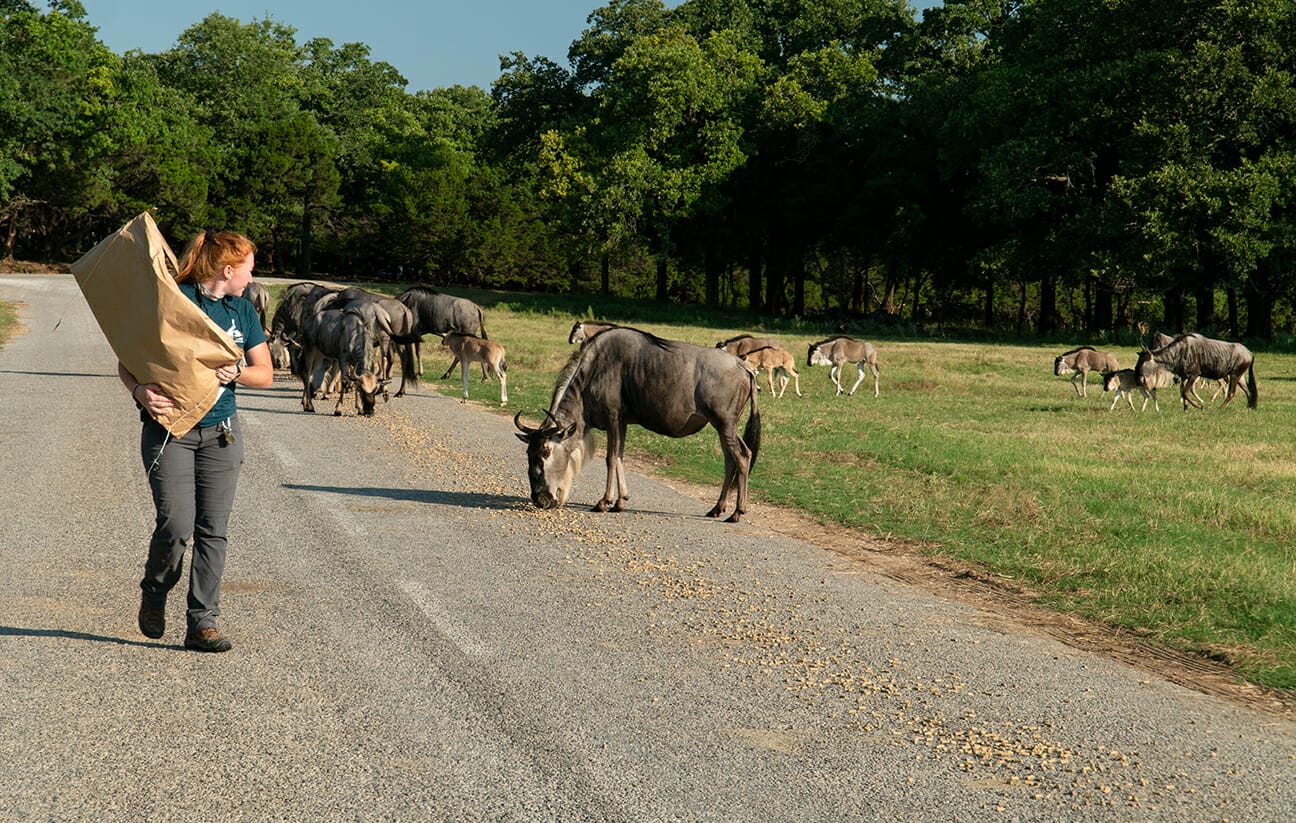
“My primary job is to cover for other staff members in these departments, and at the CAC that means stepping in for (supervisor) Kristina (Borgstrom),” Powers said.
She recognizes that soon the CAC will bring far more interaction of the human variety.
“Once the CAC reopens, those workdays will change in terms of having a lot of interaction to educate guests and do programs,” Powers said. “In hoofstock, those interactions usually come when you see a guest breaking the rules, having car trouble, or something like that. It’s about being versatile and ready to work for whatever I’m doing each day.”
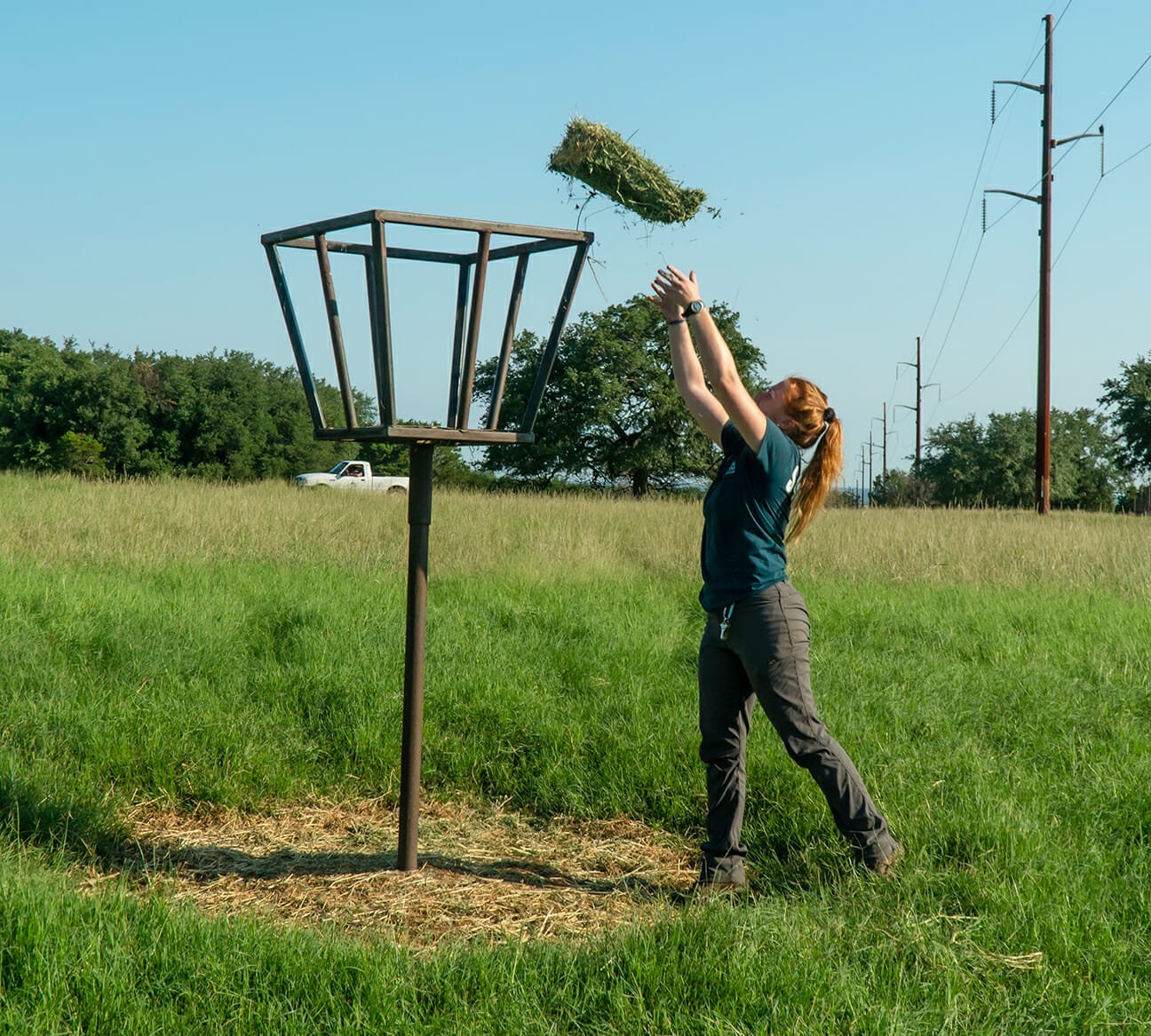
Born and raised in the small town of Greenville, Virginia, Powers talked about how her love of animals set her professional life on this path.
“I definitely point to horses for my love of animals,” she said. “I started riding in the second grade, plus I was just around animals since I was really little. I worked with horses throughout high school. In college, I got exposed to more bovids as I was working to become a large-animal vet.
“It turned out that was not my path, but it did help with my knowledge of animal anatomy, especially hoofstock anatomy. I gained experience working with exotics in Virginia and I’ve loved doing that ever since.”
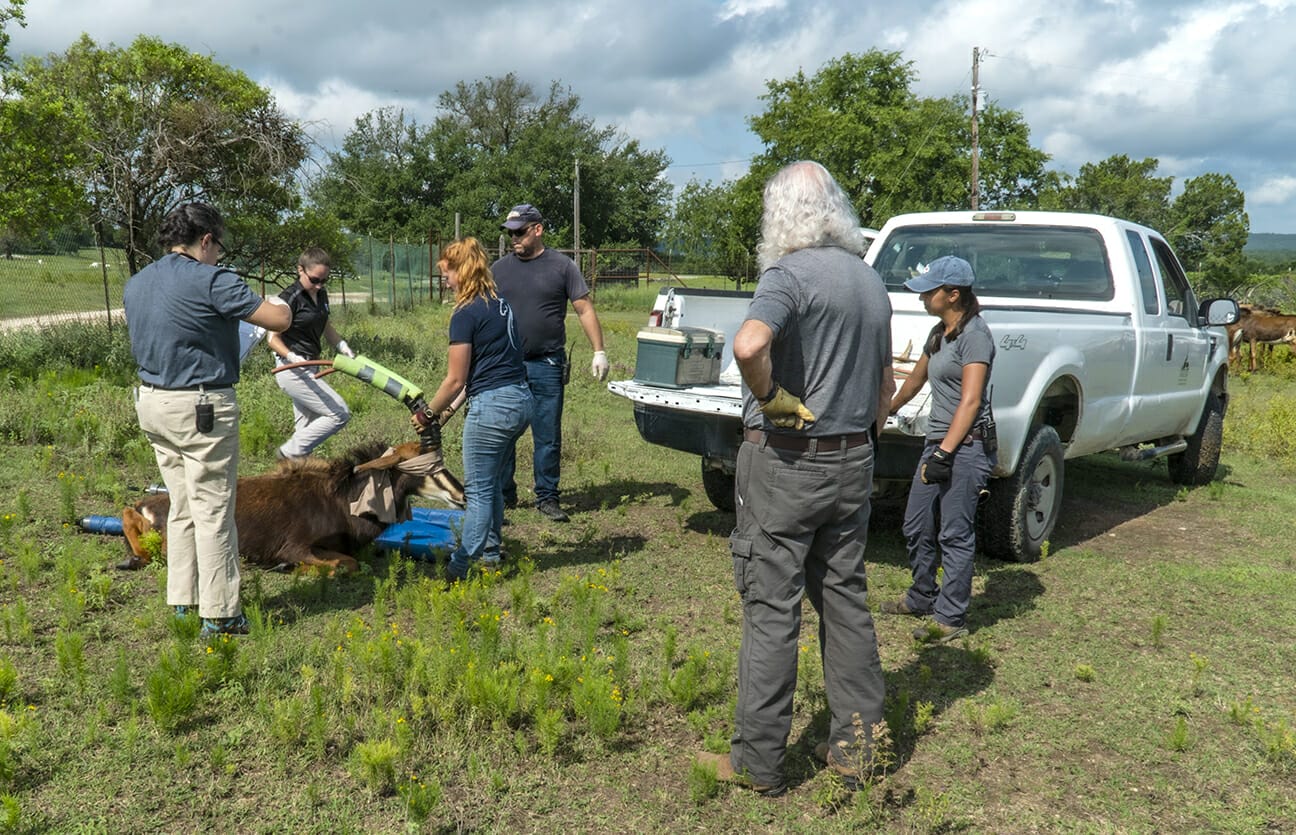
Powers graduated from Virginia Tech in 2019 with a Bachelor of Science degree, as she majored in Animal and Poultry Sciences and minored in Dairy Science. In addition to a four-month internship at White Oak Conservation in Florida, she worked at Mill Mountain Zoo in Virginia.
“Prior to working at the zoo, I’d only worked with hoofstock,” she said. “That zoo didn’t have many hoofstock species, but the experience I gained with other animals was important preparation for the CAC aspect of this job, especially the ambassador animals. In my current position, if I will develop and use good animal sense, plus be reliable in all aspects of animal care, it is going to help me develop as a professional.”
A few months into her Fossil Rim career, Powers recalled some high points thus far.
“I got to assist with black rhino procedures on ‘Salsa’ and ‘Mupani,’ as a reproductive specialist from SCBI (Smithsonian Conservation Biology Institute), Dr. Parker Pennington, came and performed ultrasounds on them to determine their reproductive viability,” she said. “That was a standout experience for me so far during my time here.
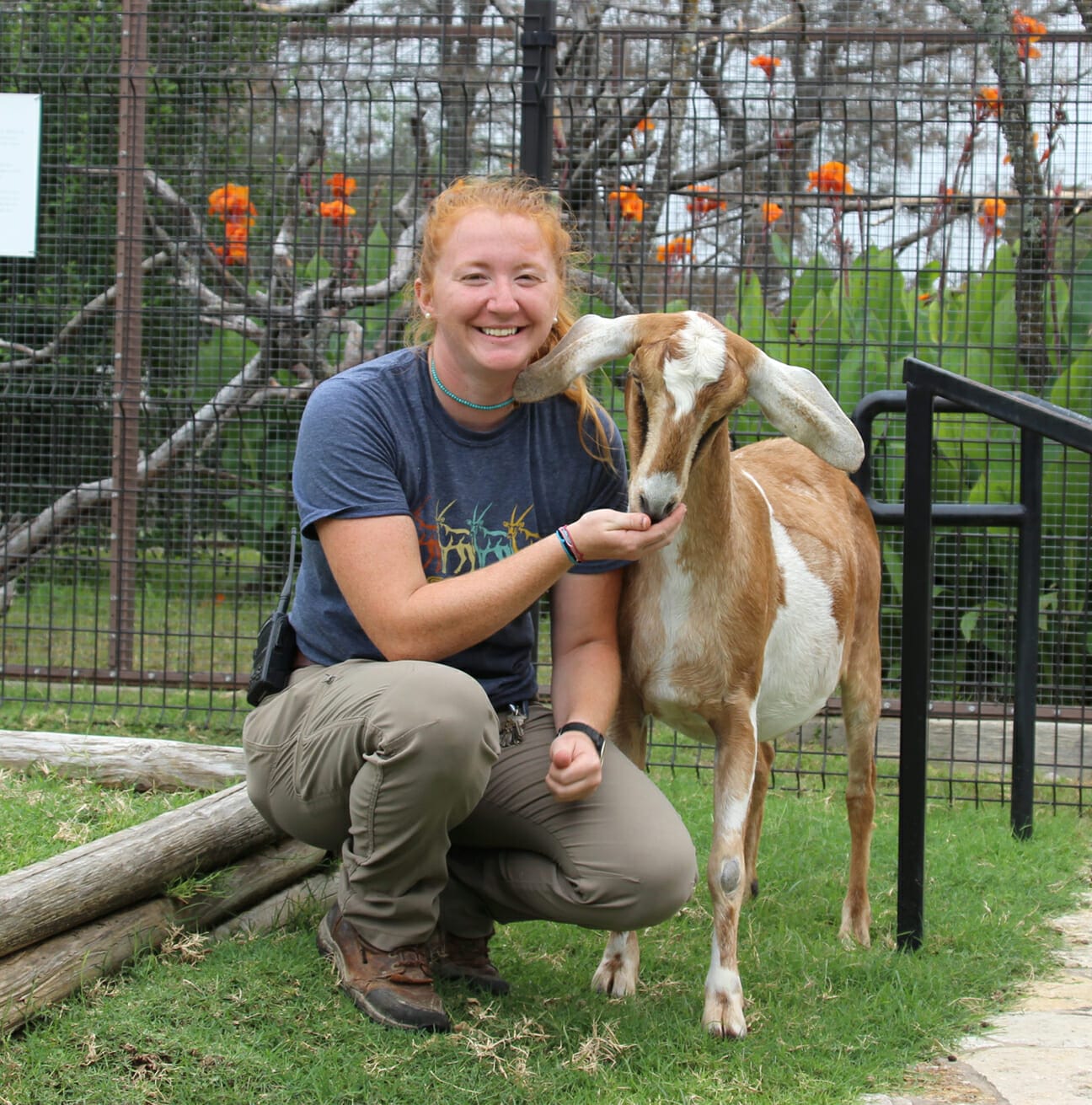
“The executive director of the International Rhino Foundation (Nina Fascione) came to talk to our staff, and I got to meet her and have lunch together. She is really awesome, down to Earth, and I learned a lot about the conservation they are doing with all five rhino species.
“Helping train interns has been another meaningful experience. Not too long ago, I was an intern myself. It has helped me learn through the process of teaching them; the educational aspect is improving my communication skills and overall it’s going to make me a better animal care specialist.”
As for being on the receiving end of training, Powers appreciates those who are taking the time to teach her.
“The animal care staff has made it known they will always answer any question so that I learn the correct way to do my duties; I appreciate their patience,” she said. “Kristina at the CAC has been super helpful, making sure I’m paying attention to all the details and training our interns correctly. On the hoofstock staff, I’ve worked with Ben (Jernigan) a lot.
“He’s awesome in terms of helping me remember ear tag numbers and ear notches, which isn’t a strong suit of mine yet. He’s really easy to get along with and good at training.”
Powers explained how training to be part of the hoofstock staff is a pasture-by-pasture progression.
“Right now, I’m trained in Front Pasture, Buffer Pasture, and the pens (area),” she said. “I’ve gotten some experience training with Molly (Shea) in Main Pasture and Game Preserve, but it’s a learning process. The basic routine is the easy part to learn; remembering what individual animals need what medical procedures done, what neonate exams we have planned, and what animals we have seen or need to see that day – those are the more difficult aspects to stay on top of. Eventually, I’ll get trained for rhinos, as well.’
As she continues to learn about Fossil Rim and the animal population, Powers is mindful about ways she can improve her performance.
“I feel that I need to become a better educator; there’s always room to improve on that,” she said. “It calls for me to be constantly learning and helping the general public see what they can do for conservation. Another focus is improving my physical strength.
“The things I’m doing are so diverse, and I just want to make sure that I’m able to keep up with the hoofstock staff. Even on my days off, I’m going to be training to be in the best shape I can be. These guys I’m with have been doing this for a while.”

She was asked about her favorite individual animal and species at Fossil Rim.
“Hard question, but I’m going to say ‘Anita’ the Nubian goat at the CAC,” Powers said. “She makes her presence well-known. I think she is really pretty and super cute with big helicopter ears.
“I have a soft spot for equids. I think my favorite species here is definitely the Grevy’s zebra. They are very unique among zebras, and I’m just biased when it comes to equids.”

Even though it is early, how is the Fossil Rim experience going for her so far?
“Being here is everything I expected it to be,” she said. “I’m having a fantastic time here. Everyone is really nice and patient when training me. Moving all the way from Virginia to Texas by myself was a big move, but it’s been worth it for sure.
“Texas has been great to me so far; this is a beautiful area. I anticipate a big change in the fall from what I’m used to, as far as bright orange and red leaves everywhere.”
Even as she is busy learning day by day, Powers keeps the big picture in mind, too.
“When I think of big-picture goals professionally, having the opportunity to work at Fossil Rim is one of them and I plan to be here for the long term,” she said. “To me, being able to help with procedures related to reproduction like I mentioned with the black rhinos and working on herd management to save species – those are the things I want for the rest of my career.”
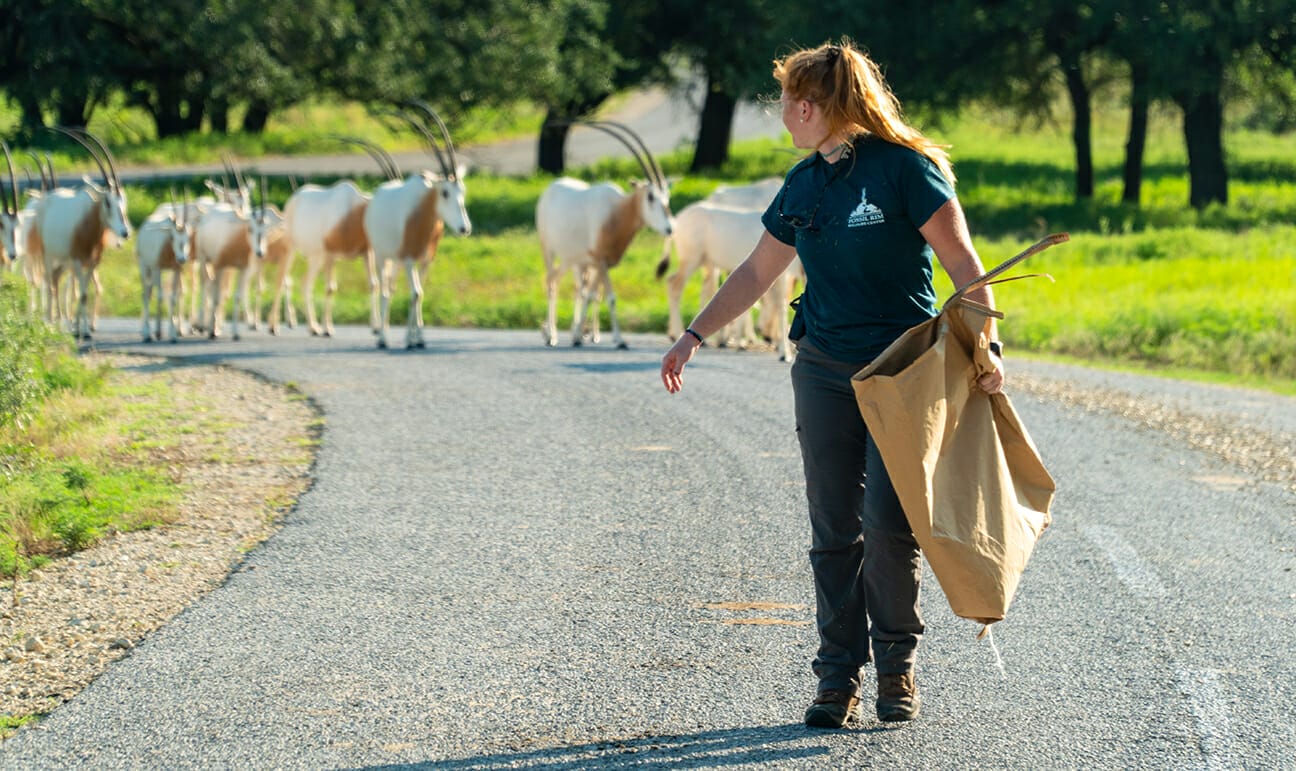
She shared some thoughts on why Fossil Rim has been successful over the long haul and why it is worth the trip for people to come check out the facility for the first time.
“There are a lot of aspects to that question – the space that Fossil Rim has to offer these animals matters and Texas is a great environment for exotics,” she said. “There aren’t a lot of places that house mixed species together, but I think it is really beneficial for these animals to be exposed to that. It is good preparation for those that are candidates to return to the wild.
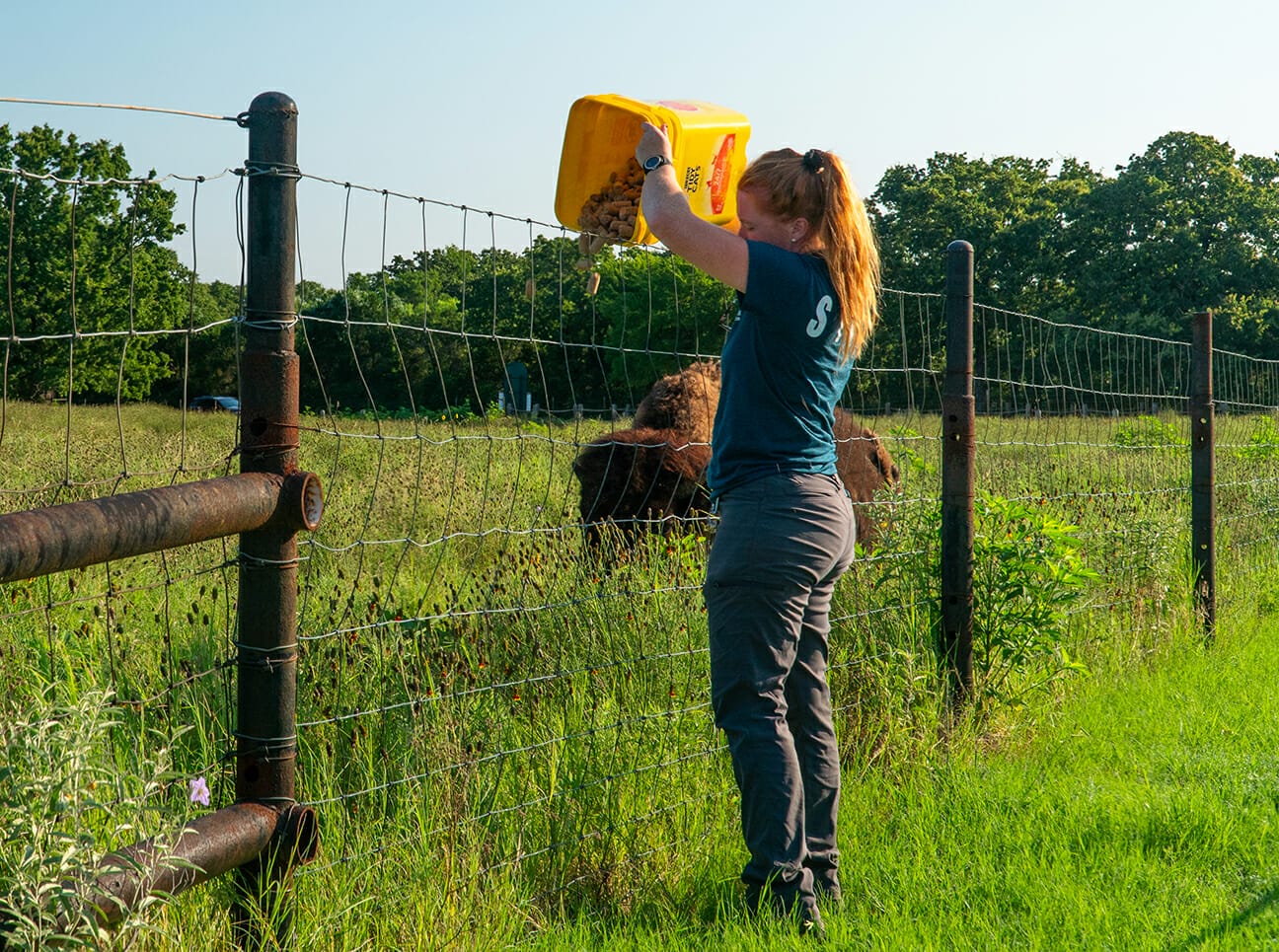
“To me, this place is the closest thing to traveling to Africa to see these species; I think that’s really special. Not a lot of facilities have free-roaming giraffes, and they thrive with that space. Fossil Rim is a fantastic place to work and I feel really privileged to be surrounded by these professionals who are going to help me learn so much in my career.”
-Tye Chandler, Marketing Associate


I am biased because she is my niece! But the article was amazing. I cannot wait to share it with friends and family. I always knew she was going to do great things. Her confidence in herself and her abilities is well earned. I am so proud…I hope to visit Fossil Rim one day.
Devan, I know that Granny would be so proud of you and so am I.
GRANDAD POWERS
It’s wonderful to know that Fossil Rim doesn’t just help develop the animals that live here, but also the many young people that come to work here, who will continue their work at Fossil Rim, and elsewhere, developing a conservation ethic and appreciation of the beautiful animals on our planet.